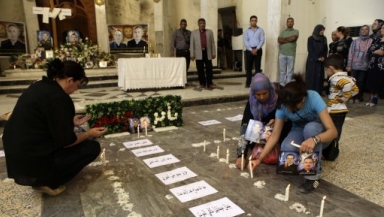
The European Parliament's subcommittee on human rights this week discussed the increasingly precarious situation of the Christian minority that exists throughout the Middle East.
MEPs discussed recent reports by the World Watch Monitor news service detailing anti-Christian violence in the region, particularly in Iraq.
For example, on September 22, a suicide bomb went off outside the home of Christian politician Emad Youhanna in Rafigayn, part of the Kirkuk province, injuring 19 people, including three of Youhanna's children.
Several bomb attacks have also taken place in the northern city of Erbil, for which Al-Qaeda claimed responsibility.
"Church leaders in Baghdad say that there are attacks on Christians every two or three days," World Watch Monitor said.
The organisation said Christians were not only worried about attacks from terrorists, but that there were institutional concerns too.
"A group of Christian young people said that policemen told them that they 'should not be in Iraq because it is Muslim territory'," the report said.
"[T]he local Kurdish government has discussed ways to monitor Christian activities and accused many English teachers from the West of being Christian missionaries. It is now much harder for Westerners to receive work permits in the country."
Canon Andrew White, the pastor of an Anglican Church in Baghdad said that in the last 10 years since Saddam Hussein was toppled, over 1,000 members of his congregation had been killed, 58 of these within a single day.
To put this trend in a broader context, White said that in the last decade Iraq's Christian population had shrunk from 1.5 million to around 200,000.
A second report highlighted the situation for Christians in places like Egypt since the invasions of Iraq and Afghanistan, and following the Arab Spring uprisings of 2011.
In Egypt, the situation is concerning, but many are more hopeful after the removal of President Mohammad Morsi and his Muslim Brotherhood led government.
Bishop Angaelos, a general bishop of the UK branch of the Coptic Church, talks in one of the documents about how in the wake of the Arab Spring many Christians are beginning to view themselves as part of a broader Egyptian community, rather than just a group unto themselves.
"It was unheard of before two years ago that Egyptian flags would be flying on the streets because people felt that they were not really part of a single nation state, so they reverted to their own religion, whether Christian or Muslim. This is a much better situation than life under Morsi," he said.
The paper points out that one Muslim Brotherhood leader said he felt closer to an Indonesian Muslim than a Coptic Christian because of the concept of the nation of Islam, the Ummah.
Present at the European Parliament discussions were Marino Busdaschin, Secretary General of the Unrepresented Nations and Peoples Organization, Archdeacon Emanuel Youkhana, Archdeacon of the Assyrian Church of the East, and Kamel Zozo, Chairman of the Organisation for Human Rights for the Assyrian Christians in Iraq.
In its position as a committee within the European Parliament, the subcommittee on human rights can advise the EP on action to take with regard to foreign policy that requires legislation.
During the debate, various speakers emphasised that more legislative measures should be taken to protect Iraq's minorities and for helping the refugees in Kurdistan.
It was also said that the EU could contribute financially and with more technical assistance.
"In Iraq, both religious and ethnic minorities continue to face risks to life, cultural traditions and economic survival in the country," said MEP Barbara Lochbihler, chair of the subcommittee on human rights.
"To ease that situation, the EU needs to ensure that financial allocations to Iraq also reach those that are most vulnerable, including the refugees in Kurdistan."













